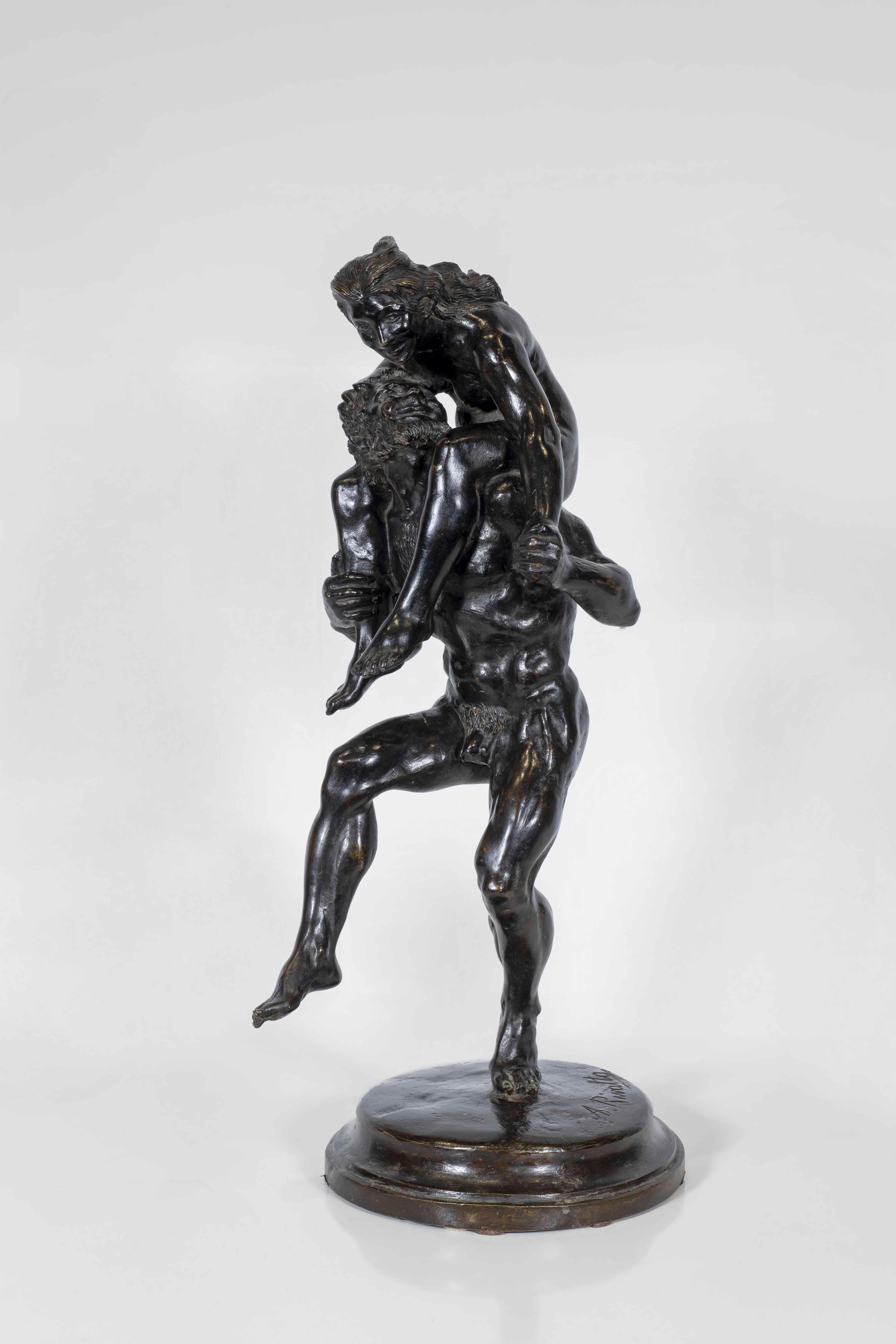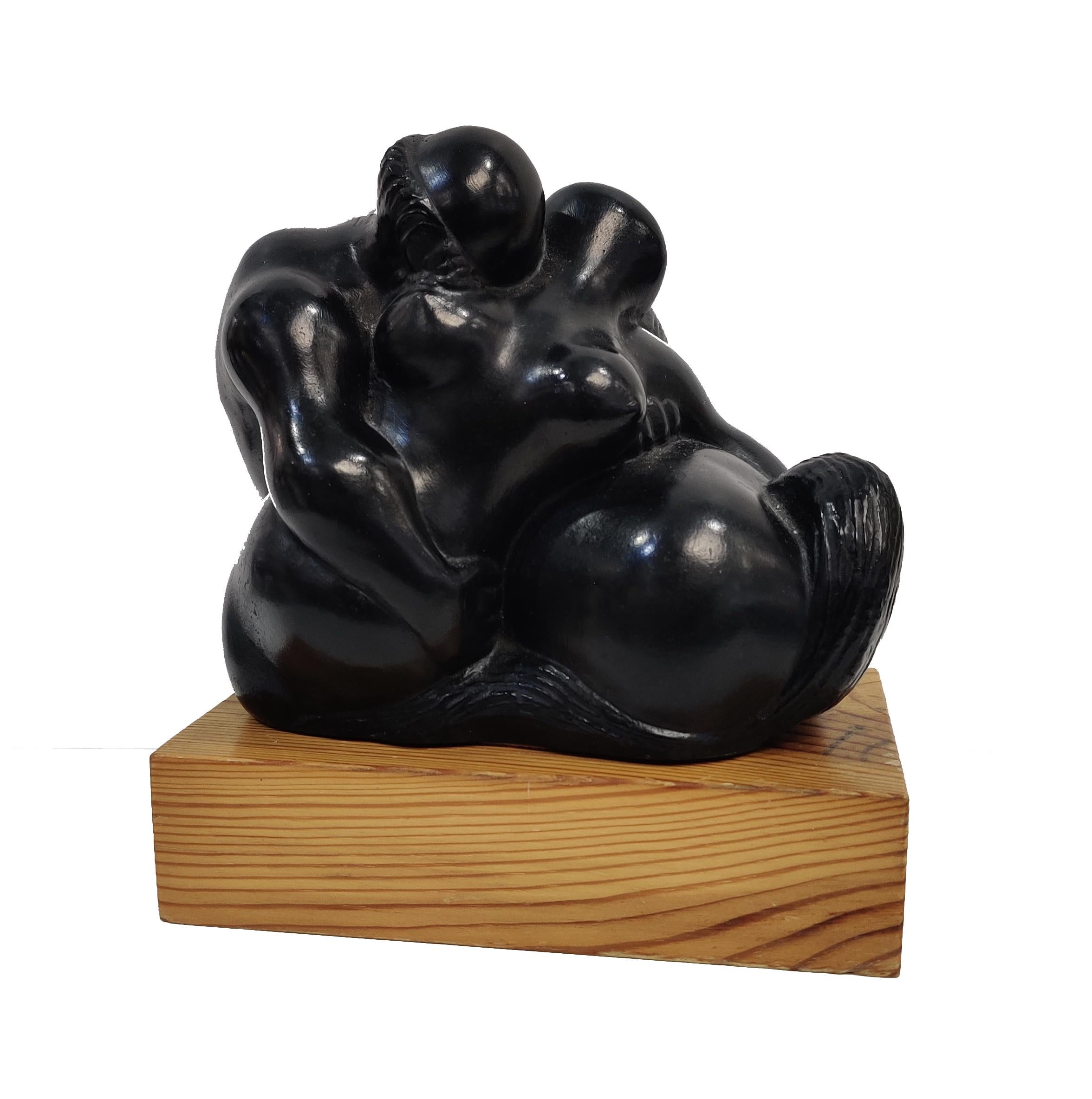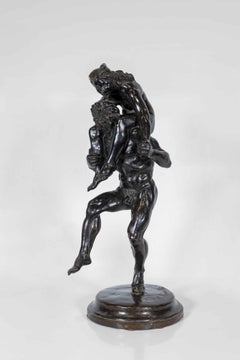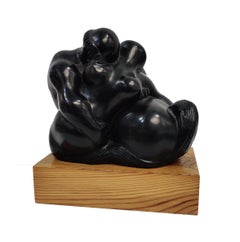Items Similar to Theseus and the Minotaur
Want more images or videos?
Request additional images or videos from the seller
1 of 9
Baltasar LoboTheseus and the Minotaur1978
1978
$124,723.27
£93,495.68
€105,000
CA$172,461.11
A$187,703.79
CHF 100,302.21
MX$2,266,745.72
NOK 1,260,553.18
SEK 1,172,461.14
DKK 800,087.33
About the Item
Theseus and the Minotaur
by Baltasar LOBO (1910-1993)
A bronze group with a greenish dark brown patina
Signed at the lower backside " Lobo "
Cast by " Susse Fondeur Paris " (with the foundry mark)
Numbered " 2/6 "
France
Model created in 1978
Cast between 1978 and 1979
height : 58 cm
diameter : 25 cm
Bibliography :
A similar model is reproduced in :
- "Baltasar Lobo, Marmor Bronzen Zeichnungen", cat exp. Galerie Nathan, Zurich, 1979‒1980.
- " Lobo : Catalogue raisonné de l'œuvre sculpté", J-E. Muller, V. Bollmann-Muller, Paris, 1985, n° 461.
- "Baltasar Lobo, Catálogo Razonado de esculturas", K. de Baranano, M. Jaume, M. L. Cardenas, Madrid, 2021, vol. II, p. 368, n° 7801.
Biography :
Baltasar Lobo (1910-1993) born in Cerecinos de Campos (near Zamora, Castilla) and dead in 1993 in Paris, was a Spanish sculptor of the new Paris School. His grandfather being a stonemason, from childhood Baltasar Lobo Casuero leart wood-working in the carpentry of his father. In 1922 he entered the studio of the sculptor Ramón Núñez in Valladolid as an apprentice where he sculpted wooden sculptures of saints for the processions. With a scholarship Lobo continued his training from 1927 at the School of Fine Arts in Madrid, which he considerd as a "cemetery" and he left after three months. His father then joined him in Madrid while he worked at the cemetery making reliefs and heads, and he attended the evening classes of the School of Arts and Crafts, specializing in the direct cutting of wood and marble. Baltasar Lobo then discovered the works of Picasso, Dali, Miró and Gargallo. In 1934 his wife Mercedes Comaposada Guillén, Lucía Sánchez Saornil and Amparo Poch y Gascón founded the journal of libertarian women's organization “Mujeres Libres”, to which he worked as a model and illustrator. Participating in the Spanish war in the Republican camp, his father was killed by a shell while digging trenches around Madrid. Most of his works being destroyed during bombings, Lobo fled in 1939 the Franco regime with survivors of the Catalan army, his wife leaving in the convoy of women. Escaped from the camp of Argelès, sleeping under the bridges of Perpignan, he managed to find her in a camp in thee Ardèche region.
When Baltasar Lobo arrived in Paris, he slept again under the bridges and at the Saint-Lazare station, joined by his wife. He went to see Picasso, who was not at home, left him a box of drawings, came back the next day and enjoyed his generous and friendly help. He could then settle in the studio that left Naum Gabo, binding with Henri Laurens and working some years in his garden the marbles that he received. His figuration was then simplified, in the spirit of the works of Constantin Brâncusi, Jean Arp, Henry Moore. Lobo developed an archaic character and continued to accentuate his non-figuration, around the themes of the female nude, Maternity and Bather, inspired by the drawings made, in a tower above the "Blue Flats", during his stays around 1945-1946 in La Ciotat where many Spaniards worked at the shipyard. He met there Brâncusi and the Spanish painters Tàpies, Parra, Xavier Oriach, Pelayo, Palazuelo.
Lobo exhibited in the 1950s and the 1960s at the Gallery Villand and Galanis (1957, 1962, 1964, 1966) near painters such as Chastel, Esteve, Gischia, Jacques Lagrange. A retrospective exhibition of Baltasar Lobo's work was presented in 1960 at the Museum of Modern Art in Madrid. Subsequently Lobo was appointed in 1981 an officer of Arts and Letters in France and received in 1984 the National Prize for Plastic Arts in Spain. Lobo realized in 1948 in Annecy a monument To the Spaniards dead for the Freedom, in 1953 a Maternity in bronze for the university city of Caracas and in 1983 in Zamora a Tribute to the poet Leon Felipe. He was credited with illustrations for "Platero and me" by Juan Ramón Jiménez. Lobo is buried in the Montparnasse Cemetery where one of his sculptures is placed on his grave (division 8, section 8). A "Baltasar Lobo Museum" presents in Zamora his work (33 sculptures, 18 drawings and many documents).
- Creator:Baltasar Lobo (1910 - 1993, Spanish)
- Creation Year:1978
- Dimensions:Height: 22.84 in (58 cm)Diameter: 9.85 in (25 cm)
- Medium:
- Movement & Style:
- Period:
- Condition:
- Gallery Location:PARIS, FR
- Reference Number:Seller: N.78271stDibs: LU2514215661412
Baltasar Lobo
Baltasar Lobo (1910-1993) born in Cerecinos de Campos (near Zamora, Castilla) and dead in 1993 in Paris, was a Spanish sculptor of the new Paris School. His grandfather being a stonemason, from childhood Baltasar Lobo Casuero leart wood-working in the carpentry of his father. In 1922 he entered the studio of the sculptor Ramón Núñez in Valladolid as an apprentice where he sculpted wooden sculptures of saints for the processions. With a scholarship Lobo continued his training from 1927 at the School of Fine Arts in Madrid, which he considerd as a "cemetery" and he left after three months. His father then joined him in Madrid while he worked at the cemetery making reliefs and heads, and he attended the evening classes of the School of Arts and Crafts, specializing in the direct cutting of wood and marble. Baltasar Lobo then discovered the works of Picasso, Dali, Miró and Gargallo. In 1934 his wife Mercedes Comaposada Guillén, Lucía Sánchez Saornil and Amparo Poch y Gascón founded the journal of libertarian women's organization “Mujeres Libres”, to which he worked as a model and illustrator. Participating in the Spanish war in the Republican camp, his father was killed by a shell while digging trenches around Madrid. Most of his works being destroyed during bombings, Lobo fled in 1939 the Franco regime with survivors of the Catalan army, his wife leaving in the convoy of women. Escaped from the camp of Argelès, sleeping under the bridges of Perpignan, he managed to find her in a camp in thee Ardèche region. When Baltasar Lobo arrived in Paris, he slept again under the bridges and at the Saint-Lazare station, joined by his wife. He went to see Picasso, who was not at home, left him a box of drawings, came back the next day and enjoyed his generous and friendly help. He could then settle in the studio that left Naum Gabo, binding with Henri Laurens and working some years in his garden the marbles that he received. His figuration was then simplified, in the spirit of the works of Constantin Brâncusi, Jean Arp, Henry Moore. Lobo developed an archaic character and continued to accentuate his non-figuration, around the themes of the female nude, Maternity and Bather, inspired by the drawings made, in a tower above the "Blue Flats", during his stays around 1945-1946 in La Ciotat where many Spaniards worked at the shipyard. He met there Brâncusi and the Spanish painters Tàpies, Parra, Xavier Oriach, Pelayo, Palazuelo. Lobo exhibited in the 1950s and the 1960s at the Gallery Villand and Galanis (1957, 1962, 1964, 1966) near painters such as Chastel, Esteve, Gischia, Jacques Lagrange. A retrospective exhibition of Baltasar Lobo's work was presented in 1960 at the Museum of Modern Art in Madrid. Subsequently Lobo was appointed in 1981 an officer of Arts and Letters in France and received in 1984 the National Prize for Plastic Arts in Spain.
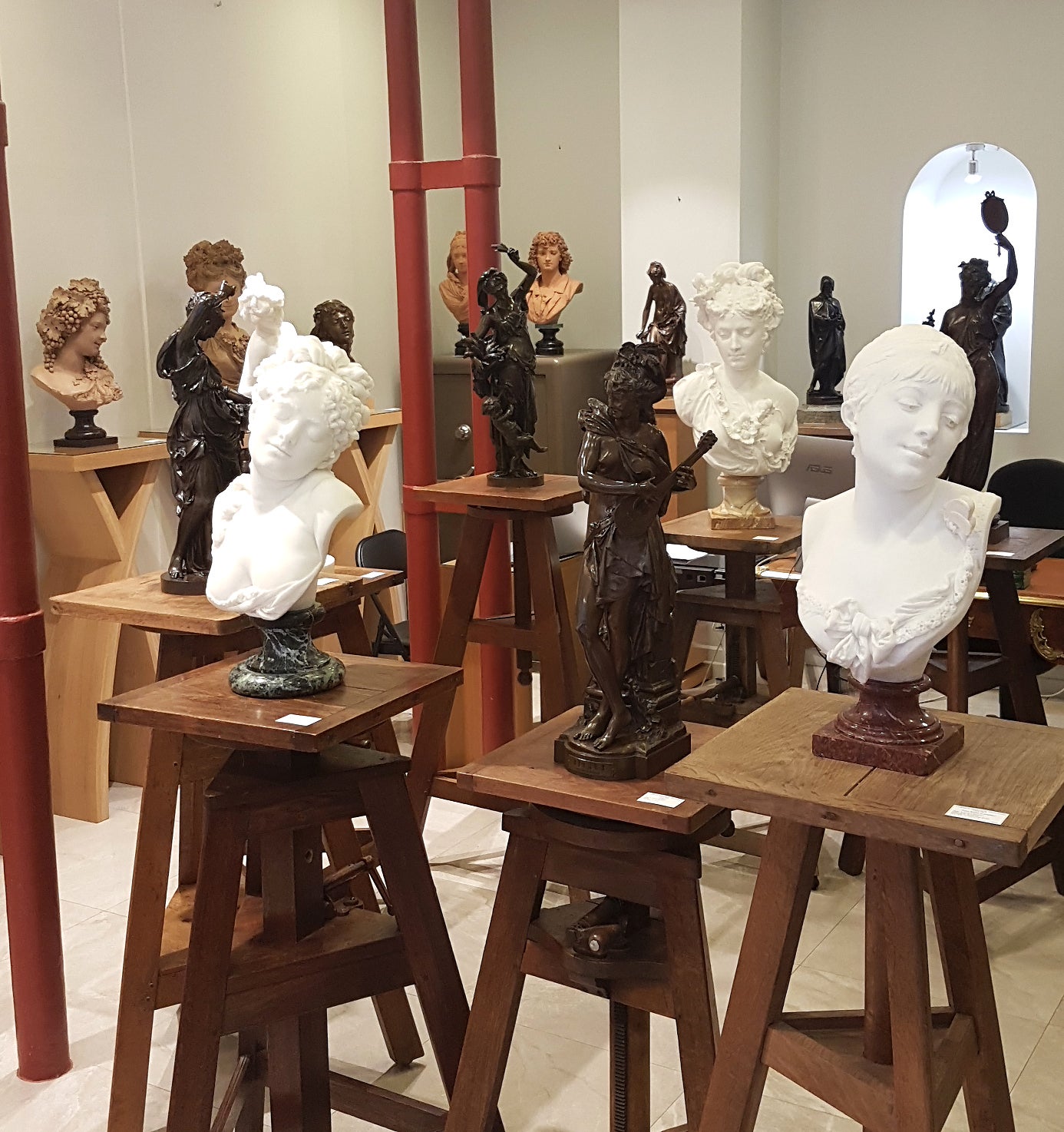
About the Seller
5.0
Recognized Seller
These prestigious sellers are industry leaders and represent the highest echelon for item quality and design.
Established in 1992
1stDibs seller since 2023
11 sales on 1stDibs
Typical response time: 6 hours
- ShippingRetrieving quote...Shipping from: PARIS, France
- Return Policy
More From This Seller
View AllMother and Child, with a base
By Baltasar Lobo
Located in PARIS, FR
Mother and Child, with a base
by Baltasar LOBO (1910-1993)
A bronze group with a dark brownish green patina
Signed on the base " Lobo "
Cast by " Susse Fondeur Paris " (with the fou...
Category
Mid-20th Century French School Figurative Sculptures
Materials
Bronze
Centaur abducting a woman
By Aimé-Jules Dalou
Located in PARIS, FR
Centaur abducting a woman
by Aimé-Jules DALOU (1838-1902)
A bronze group sculpture with a dark brown patina
Signed on the base "Dalou"
Cast by "A.A. Hébrard" (with the foundry sta...
Category
Late 19th Century French School Figurative Sculptures
Materials
Bronze
Gorilla kidnapping a woman
By Emmanuel Fremiet
Located in PARIS, FR
Emmanuel FREMIET (1824-1910)
Gorilla kidnapping a woman
A rare bronze group with a greenish dark brown patina
signed "E. Fremiet" on the base
cast by " F. Barbedienne Fondeur " (fo...
Category
Late 19th Century French School Figurative Sculptures
Materials
Bronze
Pensive à genoux
By Baltasar Lobo
Located in PARIS, FR
"Pensive à genoux, 2nd état"
by Baltasar LOBO (1910-1993)
A bronze sculpture with a brownish green patina
Signed on the base " Lobo "
Cast by " Susse Fondeur Paris " (with the found...
Category
20th Century French School Figurative Sculptures
Materials
Bronze
Motherhood
By Baltasar Lobo
Located in PARIS, FR
Motherhood
by Baltasar LOBO (1910-1993)
A bronze group with a brownish green patina
Signed at the lower front " Lobo "
Cast by " Susse Fondeur Paris " (with the foundry mark)
Number...
Category
Mid-20th Century French School Figurative Sculptures
Materials
Bronze
Motherhood
By Baltasar Lobo
Located in PARIS, FR
Motherhood
by Baltasar LOBO (1910-1993)
A bronze group with a nuanced greenish dark brown patina
Signed " Lobo "
Cast by " Susse Fondeur Paris " (with the foundry mark)
Artist's cas...
Category
1940s French School Nude Sculptures
Materials
Bronze
You May Also Like
Faun and Nymph
Located in London, GB
signed 'A. Rivalta' (on the base)
Category
Late 19th Century Figurative Sculptures
Materials
Bronze
Amancio Leonese Fight "CARNE ROTA" original sculpture bronze - 2008
By Amancio González Andrés
Located in CORAL GABLES - MIAMI, FL
Sculpture by the Spanish artist AMANCIO GONZALEZ
bronze.
Series limited to 7 copies.
Fantastic piece of art representing Spanish sculpture
Artist well known for his large format work...
Category
21st Century and Contemporary Contemporary Figurative Sculptures
Materials
Bronze
LA FEMME ET LE CENTAURE
By Baltasar Lobo
Located in Aventura, FL
Cast in bronze in 1968 in an edition of 8. Wood base. Incised 'Lobo' with edition and foundry. From the edition of 8. Sculpture size not including base 5.25 x 6.25 x 4 inches.
Artw...
Category
1960s Contemporary Figurative Sculptures
Materials
Bronze
$28,000 Sale Price
20% Off
Wrestlers VIII by Yann Guillon - Contemporary bronze sculpture, male athletes
By Yann Guillon
Located in Paris, FR
Wrestler VIII is a bronze sculpture by French contemporary artist Yann Guillon, dimensions are 47 × 44 × 29 cm (18.5 × 17.3 × 11.4 in).
This sculpture is signed and numbered, it is ...
Category
2010s Contemporary Nude Sculptures
Materials
Bronze
Minotaur - Sculpture, Bronze
Located in London, GB
Mojtaba Ramzi
1973 - Current
Minotaur, 2025
Bronze
49 x 21.5 cm
19 1/4 x 8 1/2 in
Category
2010s Contemporary Figurative Sculptures
Materials
Bronze
Maät Bronze Sculpture Contemporary Classic Mythology
By Margot Homan
Located in Utrecht, NL
Maät Bronze Sculpture Contemporary Classic Mythology
The sculptures of Margot Homan (1956, Oss, the Netherlands) show a perfect command of the old craft of modelling and sculpting, ...
Category
21st Century and Contemporary Contemporary Figurative Sculptures
Materials
Bronze
More Ways To Browse
Theseus Minotaur
Rennert Inner Dialogue
Resin Gummy Bear
Ricardo Mesa
Richard Macdonald Orpheus
Richard Macdonald Red Dress
Richard Macdonald Trumpeter Draped
Richard Orpheo
Riho Kuld
Rodin Man With Broken Nose
Rolling Ball Sculpture
Rosendo Porro Cuesta
Ruslan Karablin
Sacred Langur
Salvador Dali Bas Relief Silver
Salvador Dali Carmen Sculpture
Salvador Dali Medal
Scott Hanson
